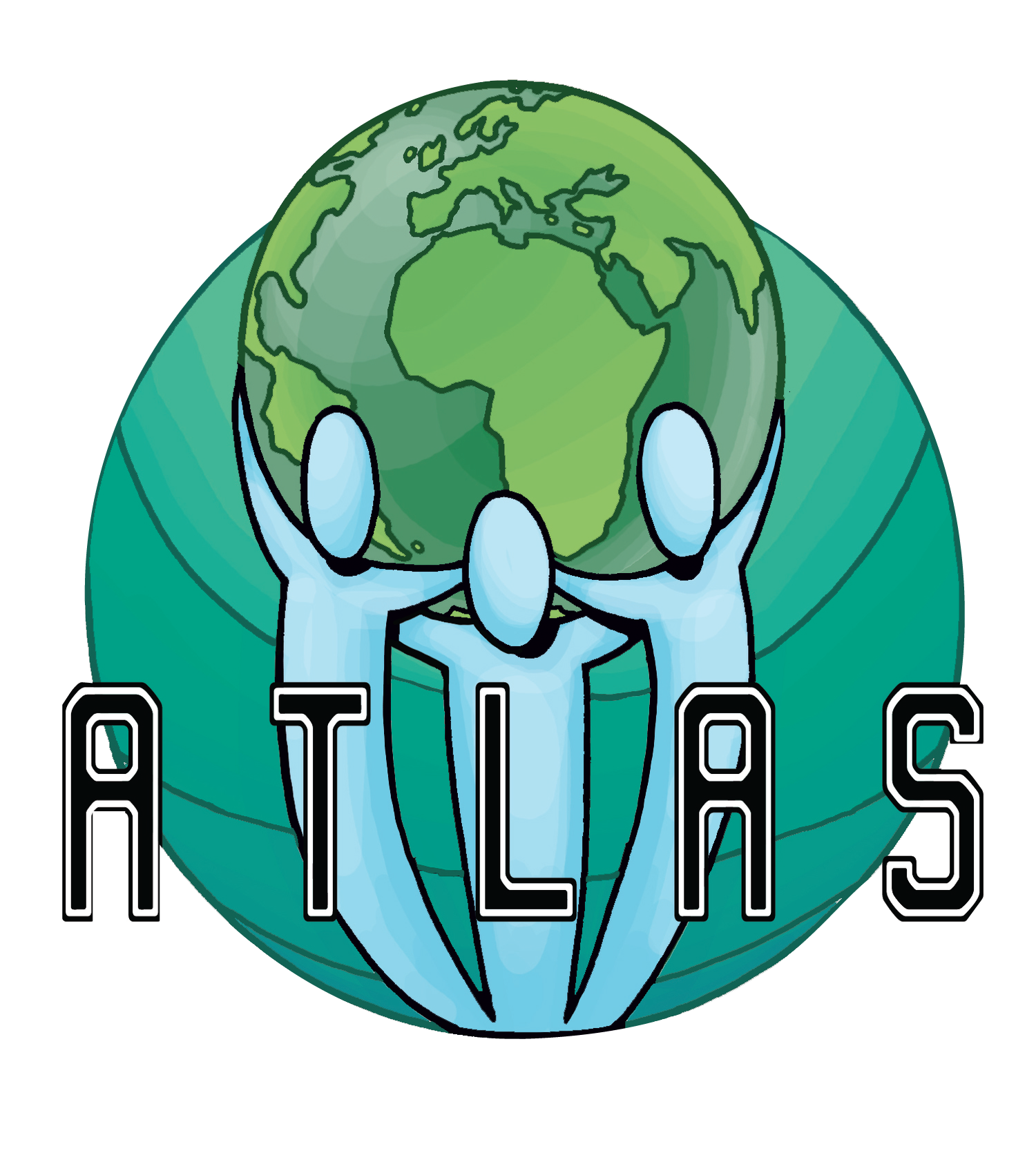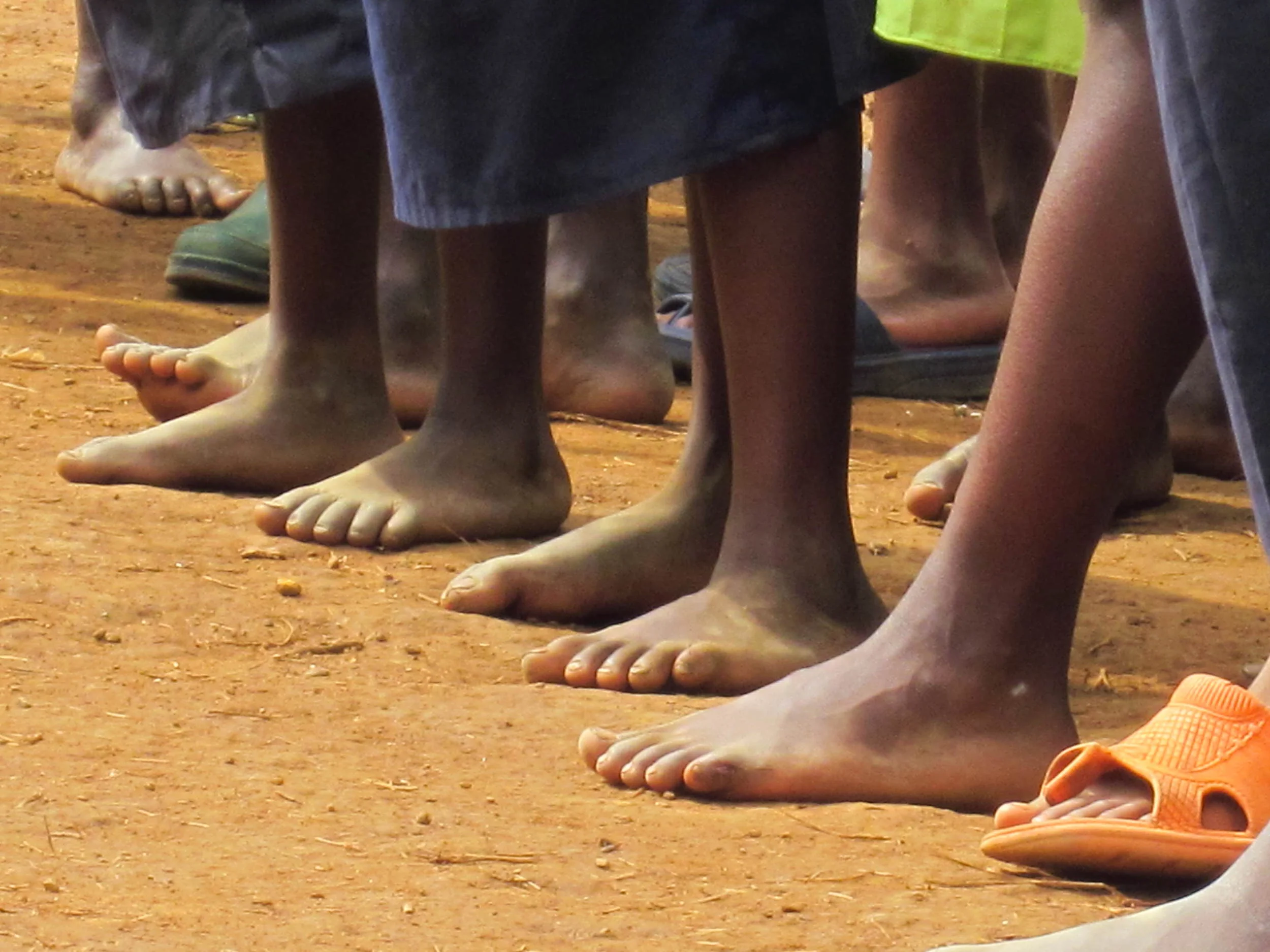atlas Embarks upon mutually beneficial projects between partners
Dr. Laura examining a child on a health outreach clinic with PDI, 2013, Bududa (photo credit Lisa Umphrey)
Clinic Health Outreaches
When larger teams arrange a medical rotation with ATLAS, we are able to provide pediatric outreach clinic days for our partners to target kids who may not have adequate access to healthcare. We perform checkups, distribute medications, and refer the kids to partner sites for vaccines or further care.
While kids wait to be seen by clinicians, non-medical volunteers can provide basic health education to waiting children and their families. Depending on donations received, we often are able to pair items like soap, toothbrushes, or toothpaste with education.
To follow our ethical principles, only teams with a certified physician are eligible to do clinic outreach days. Please contact us if you are interested in arranging a team medical rotation.
HBB training session at a rural Health Centre III, 2013, Bududa (photo credit Douglas DaSilva)
Helping Babies survive (HBS)
HBS is a suite of evidence-based hands-on training programs by the American Academy of Pediatrics (AAP) to reduce neonatal mortality and morbidity. Helping Babies Breathe (HBB), the first course developed, focuses on teaching basic newborn resuscitation skills and the principle of the Golden Minute to health workers in low-resource settings. Essential Care for Every Baby focuses on essential newborn care all babies need in the hours and days after birth. Essential Care for Small Babies focuses on the unique needs of babies born small or premature. All courses use standardized training tools plus the innovative, durable and affordable NeoNatalie or PreemieNatalie simulators to give a life-like training experience.
ATLAS recommends the HBS courses as a sustainable project for participants in our medical rotation program. Volunteers regularly teach health workers at our partner sites, and trainees can then go on to become trainers themselves. We're so proud of our participation in this fabulous program!
You can also click here to find out what it's like to participate in the class.
Dr. Georgia teaches the NRP program to doctors at Mbale Regional Referral Hospital, 2013 (photo credit Lisa Umphrey)
Advanced Neonatal Resuscitation
While many of our partners provide only basic newborn resuscitation, practitioners at MRRH provide advanced resuscitation and various advanced procedures. More highly trained volunteers may have the opportunity to lead an advanced neonatal resuscitation course, as well as working with the simulation center at MCRI to develop simulation scenarios or lead simulations for trainees. Previous volunteers have based trainings on the American Heart Association’s Neonatal Resuscitation Program, while others have used adapted resuscitation algorithms created for low resource settings.
Providing Education
The sharing of knowledge is one of the most important and sustainable ways to effect change in low resource contexts. All volunteers will prepare and give educational sessions during their rotations - sometimes formally with power points, or at the bedside, or to community groups and schools. Whether speaking to patients, community members, school children, or medical colleagues, teaching in Uganda is an impactful, memorable and fun way to contribute positively to the health of the communities we serve.
Community education, Manafwa District, 2013 (photo credit Douglas DaSilva)
School education, Manafwa District, 2013 (photo credit Lisa Umphrey)
Education session at MCRI, Mbale, 2019 (photo credit Jessica Schmidt)
RUMPs session, Manafwa, 2013 (photo credit Douglas DaSilva)
Women’s Health Education & RUMPs
Like in many places in Africa, girls are often unable to attend school while menstruating due to lack of sanitary supplies.
Peace Corps volunteers in Uganda developed a “Reusable Menstrual Pads” (RUMPs) course, which includes an adolescent and women's health lesson as well as the knowhow to make cheap and easy RUMPs.
ATLAS volunteers can bring workshop supplies and then conduct educational sessions and outreaches to teach the RUMPs course to schools and members of the community. ATLAS’s partner Casa Uganda Foundation leads the coordination of our volunteers for these incredibly important workshops.
Patient triage forms, MRRH, Mbale (photo credit Katy Miller, 2020)
Improving pediatric triage at MRRH
ATLAS volunteers conducted a pilot study of a physician refresher training in Paediatric Danger Signs, which were based on WHO emergency and priority signs and developed by local pediatric staff to include tools available at MRRH. In our pilot study, a retrospective chart review of several hundred charts demonstrated increased identification of danger signs after our training initiative and a decrease in patient mortality from 10 to 6 percent. Given the promising results of our pilot study, our ongoing project is to institute the formal development of a paediatric triage system specific to MRRH. The development of the triage system involves two major components: first, an adapted ETAT training for physicians; and second, the development of a quality improvement initiative to track ongoing use of the system.
Medical students at the end of the adolescent medicine curriculum pilot, 2020 (photo credit Katy Miller)
Adolescent Medicine Curriculum Pilot
Led by Dr. Katy Miller, her team developed and piloted an adolescent medicine curriculum, which was piloted for Busitema University medical students in 2020. This curriculum is specially adapted for low resource setting and focuses on providing adolescent friendly care in contexts where adolescent health is often neglected. This curriculum will continue to evolve and be adapted as future medical students complete the course.
POCUS team, Mbale, 2019 (photo credit Jessica Schmidt)
Point of care ultrasound
In 2019, Dr. Jessica Schmidt, a specialist in emergency medicine from the UW Global Health Institute, first went to Uganda with ATLAS to launch a cardiopulmonary ultrasound project with MRRH. Her team have since made multiple trips to Mbale with us for ongoing teaching in ultrasound and learning about medical care in the region. The project focuses on teaching pediatric residents, MRRH & Busitema University faculty, lecturers and clinical researchers at MCRI.
POCUS, Mbale, 2019 (photo credit Jessica Schmidt)
Teaching POCUS, Mbale, 2019 (photo credit Jessica Schmidt)
Dr. Olupot-Olupot & Dr. Schmidt with MRRH’s new US machine, Mbale, 2019 (photo credit Jessica Schmidt)
Clinician consulting patients at Station 3, Manafwa District, 2013 (photo credit Douglas DaSilva)
The Station System
Created by Dr. Umphrey in 2009, the Station System and Outreach Program Model addresses the challenges of healthcare provision in under-resourced settings in a standardized and easy to replicate way. Instead of focusing on a health center as a group of people treating patients, the model restructures the clinic into an operational system independent of individual staff. The model divides the clinic into specific Stations, each with clearly defined duties and expectations of the staff assigned to the Station, and patients follow a specific path through the Stations based on their initial triage. Additionally, the model incorporates strong health outreach programming to reduce patient volume at the overburdened health centers, to increase awareness in the community about health and disease prevention, and to link the community to the health center as one functioning unit.
Each Station has a set of forms and tools meant to quicken non-clinical work and to circumvent the inefficient administrative tasks inherent to running a clinic without computers, electricity nor enough personnel and supplies. Some of these forms are government forms or adaptations of government forms, and many are specific for the Station System model. These forms can be adapted as needed for the particular clinical site’s needs and goals.
If you are interested in discussing implementing the Station System at your health center, please contact us here.
Pediatric physical examination: Master trainer project
In Uganda, many non-pediatric specialists are tasked with providing care to children of all ages, and unfortunately many people are not comfortable with children. To address this gap, ATLAS created a pediatric physical examination curriculum with videos to help health workers improve these essential skills. To ensure this training program was scalable, we trained a “Master Trainer” health worker who became the porject’s expert on pediatric exams, and she in turn provided the training to colleagues throughout the region. Videos are short, concise and made for Ugandan health worker audiences - check them out!
Introduction to the Pediatric Examination Skills Videos
Special Considerations for the Pediatric Physical Examination
Tribute to Riley Hoff-Larocca, 2017 (video credit Katy Miller), featuring David and Elizabeth Zaale
A gift from riley
In April 2017, a longtime friend to ATLAS and one of Dr. Umphrey’s former volunteers, Riley Hoff-Larocca, died tragically in a car crash that robbed those who loved him of his unique spark far, far too soon. Riley’s friends and family wanted to honor him by making contributions to the community he had come to love during his trip to Uganda as a college student. The outpouring of support was truly amazing, and with Riley’s help, we were able to help construct school blocks for our partner organization, Pathways Development Initiative in Bududa District.
In the years since his death, Riley’s memory has been a part of dozens of students’ school experience as they learn and thrive within the walls of the PDI school. ATLAS volunteers have the opportunity to conduct health outreach sessions for primary students at the school, and they routinely carry supplies and donations from the USA to the team.
PDI students running home after class (photo credit Annette Champney 2018)
PDI students playing outside (photo credit Katy Miller 2020)
PDI students in class (photo credit Katy Miller 2020)
Dental hygiene education (photo credit Annette Champney 2018)
Can we help you find something?


















